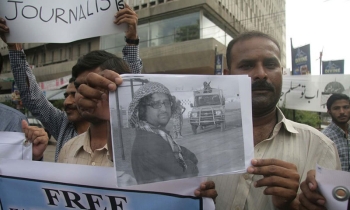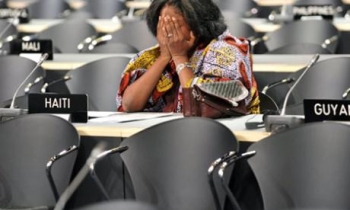Americans, usually critical of the media, have given the news coverage of Hurricane Katrina a thumbs up, and major outlets are pledging to stay on the story to find out what went wrong with the response to the disaster.
"We haven't had this many people committed to a story since I don't know when," says CBS News executive Marcy McGinnis, who estimates that the network has 200 staffers on the story, on par with competitors. "We're in it for the long haul – with as many people as it takes to be done."
ABC News has "not stinted to cover the immediate disaster, and we will not stint on resources to cover the post-disaster," says ABC News executive Paul Slavin.
"Katrina has uncovered grave weaknesses in this country's ability to handle a crisis, and we need to make sure we hold officials accountable and investigate as best we can both what happened and what might happen," he says. He compares the reporting to come to the reporting that came after 9/11. "This is a similar call to arms."
A Pew Research Center study of 1,000 Americans Sept. 6 and 7 found that 65% rated news coverage of the hurricane good or excellent, more favorable than the 54% approval rating for 2004 presidential election coverage.
Television dominated as the main source of information, with cable in the lead: CNN was the main source for 31% of respondents, compared with Fox (22%); local news (19%); ABC (14%); NBC (12%); MSNBC (9%) and CBS (8%).
The cumulative effect
Tom Rosenstiel of the Project for Excellence in Journalism hopes that many news organizations continue to work the story, "each one synthesizing and adding to what others are learning. If only one or two news organizations do it, it won't have the same effect."
The question is "how many news organizations have the investigative muscle to handle a story this complex, and how many can afford to lose a team for the time it will take to do that, especially in TV," Rosenstiel says. "I fear the list of news organizations that can do that today is not very long. And sadly, it gets shorter if ad sales go down and other news pushes Katrina off our radar screens."
But as for network news staffers, "People don't want to leave it," says CBS 60 Minutes chief Jeff Fager. "They want to stay, even though covering Katrina has been so difficult and painful in so many ways."
He says the disaster will yield "a number of stories" on the top-rated newsmagazine in coming months. "The scope of human devastation is a significant story for us – and for anybody." Sunday on 60 Minutes, New Orleans police superintendent Edwin Compass told correspondent Ed Bradley that officers who disappeared or quit are "cowards."
Meanwhile, at ABC News, "we might as well open up a full-time bureau in New Orleans," says investigative correspondent Brian Ross. On Friday's World News Tonight, he examined why the Federal Emergency Management Agency placed Pat Robertson's charity second behind the Red Cross on a list of relief organizations to which people can send money.
"There are so many angles to follow up: government incompetence, sophisticated charity scams, how insurance companies treat victims, construction of the levees, who will start ripping off the billions of dollars available in new contracts," Ross says. "Every single one of these stories is going to be a big one."
The reaction from abroad
CNN's Jeff Koinange, who usually reports from Nigeria, where he is based, was on vacation in North Carolina when the network asked him to cut the trip short and report on Katrina.
The hurricane has received huge play on CNN International and is of tremendous interest internationally, Koinange says. "I get at least 100 e-mails at the end of every day from viewers who say, 'Wow, this is America? Are you sure you're not making it up or reporting from Somalia and not somewhere else?' They simply cannot believe it."
And stunning images are likely to continue to flow. The Bush administration agreed Saturday to not prevent media from following the effort to recover bodies but will not allow photographers to join federal rescue workers in boats or helicopters during missions to recover bodies from flooded homes.
CNN had filed suit against FEMA in U.S. District Court in Houston Friday after government officials said the news media had no right to show pictures of Katrina victims. In a hearing Saturday, Army Lt. Col. Christian DeGraff promised that recovery teams would not bar the media from watching, and CNN agreed to put its case on hold.
Jim Walton, CNN Newsgroup president, said CNN has proven in this story and others that it doesn't put gratuitous images on the air.
Said Army Lt. Col. Richard Steele: "We're not going to bar, impede or prevent" the media from telling the story. "We're just not going to give the media a ride."
"These people deserve to have the world watching what is happening to them," CNN's Anderson Cooper says. "And I'm not just talking about the victims of this tragedy and the people who are still dying in their homes. I'm talking about first-responders who are here without latex gloves and without respirators.
"This is going to be a difficult week ahead, for families watching at home and for first responders collecting the people and trying to restore them some dignity," Cooper says. "There's not a lot of dignity to be had in these floodwaters."









